Together with the Health Insurance and Unemployment Insurance policies, Social Insurance creates a comprehensive system to protect people, especially the vulnerable, from risks such as illness, accidents, unemployment, and old age. Social Insurance policies not only help workers stabilize their lives during work but also support them when they are no longer able to work.
Overview of the formation and development process of social insurance policy
The history of social insurance policy in our country is closely linked to the process of fighting for independence, building and developing the country. As early as 1929, the orientation of insurance policy for workers was stated in the Manifesto of the Indochinese Communist Party. After the Democratic Republic of Vietnam was established in 1945, the 1946 Constitution provided orientation for the promulgation of the Social Insurance Law and social policies.
During the period of centralized planning economy , social insurance policy was mainly applied to cadres, civil servants, state employees and armed forces. In the period of renovation, especially since 1995, social insurance policy has undergone a strong transformation. On January 26, 1995, the Government issued Decree 12/CP promulgating the Social Insurance Regulations, applying compulsory social insurance to civil servants, state employees and all contract workers. This event marked the establishment of an independent Social Insurance Fund, separate from the State budget. The Fund was built on the principle of contributions from employees, employers and the State, affirming the principle of contribution - benefit. The subjects participating in compulsory social insurance were expanded to employees working under labor contracts of 3 months or more at enterprises employing 10 or more employees, and enterprises with foreign investment capital.
The period 2006-2015 marked the completion of the legal corridor. On June 29, 2006, the National Assembly passed the Social Insurance Law (Social Insurance Law 2006), creating a solid legal corridor for the implementation of a more comprehensive and effective social insurance policy. The law took effect from January 1, 2007 for compulsory social insurance; from January 1, 2008 for voluntary social insurance and from January 1, 2009 for unemployment insurance. The Social Insurance Law 2014 (effective from 2016) continued to expand the subjects of compulsory social insurance (including people working under contracts of 1 month or more, foreigners working in Vietnam from 2018), flexibly paid voluntary social insurance and adjusted the pension calculation method.
The period from 2016 to present has witnessed a breakthrough in policy implementation, especially in promoting administrative procedure reform (AP), applying information technology (IT) and digital transformation. Party Resolutions such as Resolution 28-NQ/TW (2018) on reforming social insurance policies have set the goal of developing a universal, multi-layered, flexible and sustainable social insurance system. The Social Insurance Law 2024, effective from July 1, 2025, continues to expand the scope of social insurance participants and adds many benefits for participants and beneficiaries.
Social insurance policies are increasingly perfect and superior.
It can be seen that, through the process of formation and development, the social insurance policy in our country has been increasingly improved in the direction of increasing the rights and benefits of participants, in line with the socio-economic development situation and approaching international practices. The superiority and humanity of the policy are clearly demonstrated through the development from compulsory social insurance to voluntary social insurance and the expansion and improvement of benefits for participants.
Specifically, compulsory social insurance provides five important regimes: sickness, maternity, work-related accidents and occupational diseases, retirement and death. These regimes help employees stabilize their lives when they encounter risks and incidents during their work and when they are old and no longer able to work. For businesses, employees' full participation in social insurance is not only a legal responsibility but also helps them attract and retain employees, creating motivation for production and business development. The policy is based on the principle of contribution - benefit, ensuring that those who contribute more and pay longer will receive higher benefits, demonstrating fairness and equality. At the same time, there is sharing among members of society and the responsibility of employers to contribute. The social insurance fund is protected by the State, ensuring sustainable payment capacity. Pensioners have their benefits adjusted periodically according to the consumer price index and economic growth. In addition, pensioners are also covered by the Social Insurance Fund for lifetime health insurance cards, with coverage of up to 95% of medical examination and treatment costs.
Regarding voluntary social insurance: Before 2008, the social insurance policy was only compulsory. Voluntary social insurance was established in 2008, creating opportunities for workers in the informal sector, who are not subject to compulsory participation, to access retirement and death benefits. Voluntary social insurance participants are also entitled to retirement benefits (monthly pension) and death benefits (funeral allowance, one-time death benefit). Similar to compulsory social insurance, pensioners from voluntary social insurance are also granted free health insurance cards for life. In addition, according to the Social Insurance Law 2024 (effective from July 1, 2025), voluntary social insurance participants are also entitled to additional maternity benefits. Voluntary social insurance has diverse and flexible contribution levels and payment methods, suitable for the financial capacity of many people. More importantly, the State has a policy to partially support the contribution level for voluntary social insurance participants. The level of support is based on the poverty line in rural areas (30% for poor households, 25% for near-poor households, 10% for other groups), for a maximum of 10 years. In addition, many provinces and cities also provide additional support from local budgets. Like compulsory social insurance, voluntary social insurance is also a social security policy organized and implemented by the State, protected by the State, not for profit. The sole purpose is to ensure the lives of people when they are old, when they are no longer able to work...
Vietnam Social Security always strives and achieves many positive results in developing and serving participants and beneficiaries of social insurance policies.
Efforts to serve participants and beneficiaries
Recognizing the important position, role and benefits of the social insurance policy, as the agency assigned to implement this policy, over the past time, Vietnam Social Security has made continuous efforts, closely following the leadership and direction of the Party, the National Assembly, the Government, the Prime Minister and the Ministry of Finance in implementing its tasks. With the motto "Taking people and enterprises as the subject and center of service", Vietnam Social Security has achieved many outstanding results, strengthening the trust of people, workers and enterprises in the social insurance policy.
Specifically, the number of people participating in social insurance has been continuously expanded, growing impressively from 2.276 million people in 1995 to 18.418 million people in 2023. By the end of 2024, the number of people participating in social insurance will reach 20.159 million people, accounting for 42.71% of the working-age workforce, steadily moving towards achieving the target according to Resolution 28-NQ/TW. In particular, the number of people participating in voluntary social insurance has also grown remarkably. In 2019, the growth in the number of people participating in voluntary social insurance was equal to the total number of participants in the previous 11 years combined. By 2020, the whole country had 1.125 million people participating in voluntary social insurance and this number reached 2.311 million people by 2024 (twice as much as in 2020), equivalent to 4.9% of the working-age workforce (including farmers and informal sector workers, exceeding 2.3% compared to the target for the period up to 2025 in Resolution 28-NQ/TW of the Central Executive Committee).
Regarding policy settlement, the number of people receiving social insurance benefits has increased rapidly: In 1995, the whole country had 976 people receiving monthly social insurance benefits, by 2024 this number was 113 thousand people, an increase of nearly 116 times. The number of people receiving unemployment benefits increased from about 150 thousand people in 2010 to over 900 thousand people in 2024, an increase of 6 times. From 2010 to the end of 2024, the total number of people with decisions to receive unemployment benefits reached nearly 10.7 million people.
In 2024, Vietnam Social Security paid monthly pensions and social insurance benefits to more than 3.3 million beneficiaries (of which, the Social Security agency directly paid through personal accounts to 70% of beneficiaries nationwide); resolved new monthly benefits for 113,005 people; 1,388,525 people received one-time social insurance benefits; 9,089,560 people received sick leave, maternity leave, convalescence, and health recovery benefits; coordinated to resolve 910,102 people receiving unemployment benefits and vocational training support.
In order to improve service quality, Vietnam Social Security has promoted administrative procedure reform, regularly reviewed, simplified, and minimized processes, procedures, documents, records, forms, and implementation time; effectively applied digital technology, revised administrative procedure processes to reduce costs, and maximize convenience for people and businesses when transacting with social security agencies. The number of procedures, documents, forms, records, and implementation time has been minimized, and electronic transactions have been promoted (people and businesses can interact and transact with social security agencies 24/7 in the fastest, most reformed, and most convenient way). From 263 procedures in 2009, the industry has reduced 238 procedures to 25 procedures (in 2024, equivalent to a 90.5% reduction). Vietnam Social Security has promoted the payment of sickness, maternity, convalescence, and unemployment insurance benefits through bank accounts. Currently, 100% of beneficiaries of these regimes and over 80% of pensioners and monthly social insurance beneficiaries in urban areas have been paid through bank accounts.
Vietnam Social Security has also been promoting the application of IT and digital transformation in all areas of work to implement digital government, ensure social security, and reduce transaction time and costs. In implementing Project 06, Vietnam Social Security has connected the National Population Database, authenticated more than 99.8 million people, deployed chip-based CCCDs, VNeID to replace paper health insurance cards, helping to simplify medical examination and treatment procedures and save costs. Currently, 100% of health insurance medical examination and treatment facilities have applied chip-based CCCDs/VNeID, helping to reduce the procedure time to 6-15 seconds. Vietnam Social Security has also integrated many online public services; the VssID application - digital social insurance is continuously upgraded, supporting employees in the process of participating in and enjoying policies...
It can be seen that the social insurance policy in our country has undergone a process of continuous formation and development, increasingly affirming its role as the main pillar of the national social security system. With its superior and deeply humane values, the social insurance policy has been bringing practical benefits, increasingly ensuring the rights of workers and people against risks and fluctuations in life. In addition, the outstanding results that Vietnam Social Security has achieved in implementing policies, reforming administrative procedures, applying information technology and improving service quality have further strengthened the trust and satisfaction of participants. In the next period, Vietnam Social Security will continue to make efforts and innovate to successfully implement the set goals, towards the goal of universal social insurance, contributing to the country's sustainable social security./.
Source: https://baolaichau.vn/xa-hoi/bao-hiem-xa-hoi-chinh-sach-uu-viet-nhan-van-vi-quyen-loi-nguoi-lao-dong-1147086



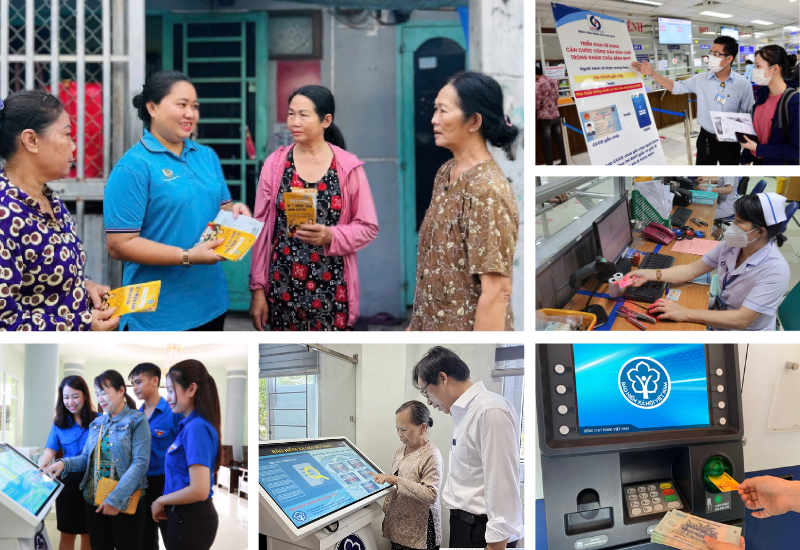
![[Photo] Prime Minister Pham Minh Chinh receives leaders of Excelerate Energy Group](https://vphoto.vietnam.vn/thumb/1200x675/vietnam/resource/IMAGE/2025/5/29/c1fbe073230443d0a5aae0bc264d07fe)
![[Photo] Prime Minister Pham Minh Chinh attends the event "Digital transformation of the banking industry by 2025"](https://vphoto.vietnam.vn/thumb/1200x675/vietnam/resource/IMAGE/2025/5/29/0e34cc7261d74e26b7f87cadff763eae)




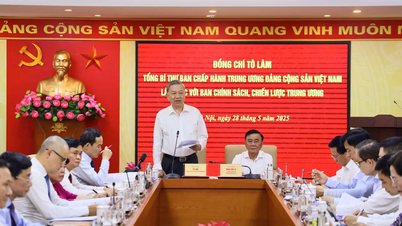

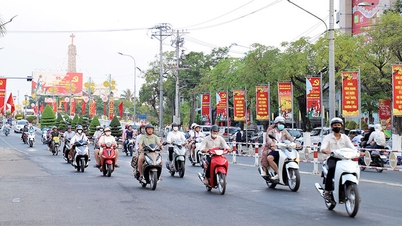













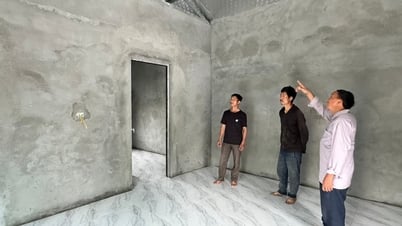










































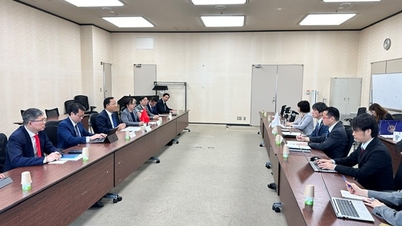

























Comment (0)